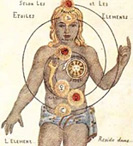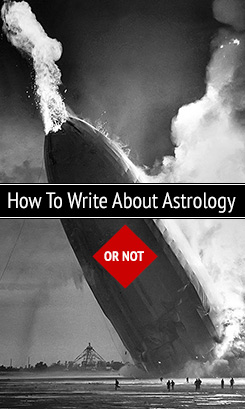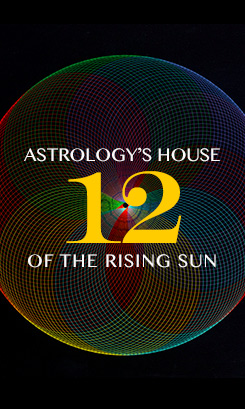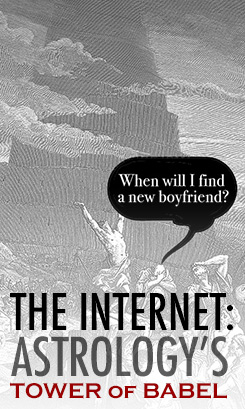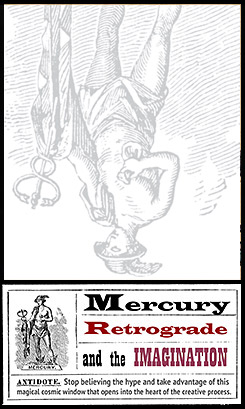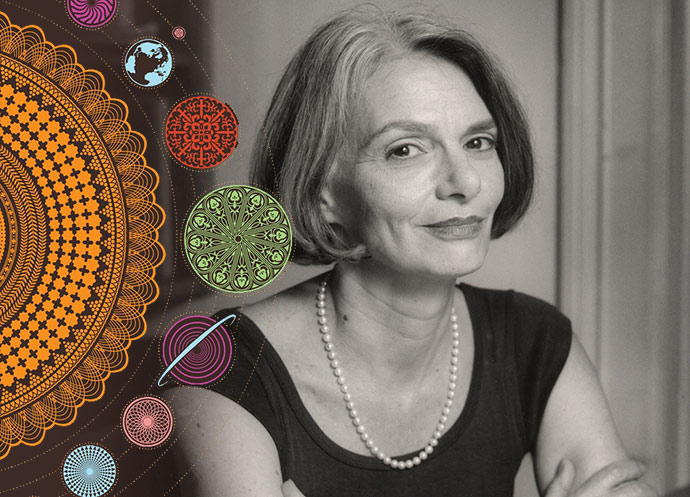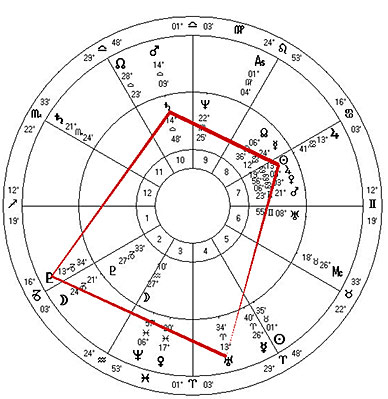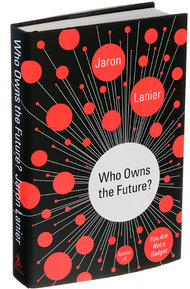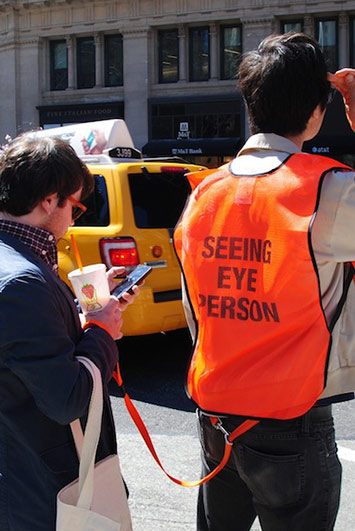Finding a Way Through: An Interview With Astrologer Jessica Murray
Jessica Murray is a professional astrologer with a fascinating personal history that involves writing, publishing, political activism and a command of semiotics. Semiotics is a field of study, some would call it a science of sociological code-breaking, that involves reading the language of signs.
The concept of semiotics is easier to grasp if you think of it as a system that attempts to understand how human beings create meaning from the manner in which reality displays itself, be that through events, words, images and objects.
Ideally, astrology benefits from the semiotic approach because astrology too is a language, a language that is brought to life by the linguist’s ability to skillfully interpret signs and symbols. If we think of an astrological chart as a signature of the soul, you can see how a confluence of astrological and semiotic insight would make for a formidable astrologer. And Jessica is very much one of contemporary astrology’s most creative and vibrant authors. Her close readings of the sociopolitical landscape are both dazzling and educational.
Jessica lives in San Francisco and writes regularly for her website Mother Sky. She has published two books, Soul-Sick Nation and At The Crossroads, both available here.
Our discussion centers around themes related to the ongoing and unprecedented Uranus Pluto square, a planetary component of the unfolding “Cardinal Cross Years,” which comprise our current historical moment — a time when “the modern Western mind … with its machines and weapons and power games, has grown so out-of-whack as to be needful of tough-love intervention, like a self-harming child…Our goal must be to get in touch, on a gut level, with the fact that the breakdowns we see around us are signals of incipient breakthrough.”
Frederick Woodruff: Many astrologers have forged frightening adjectives to the ongoing Uranus Pluto square, and I’d like to do something unusual and explore a positive implication of this monumental transit.
Last week, while preparing for our talk today, it occurred to me that for the first time in the United States’ history, individuals are being relieved of an awful burden, that burden being the tyranny of the American Dream. That ceaseless pressure to acquire and achieve — more and more and more — under the weight of the illusion that material success equates with happiness and satisfaction.
I believe this is what many freethinking individuals first realized and then rebelled against when Uranus and Pluto conjuncted in the mid-60s, at the start of the counterculture movement.
The old notion of what denoted a successful or fulfilled life became infused with a kind of spiritual or philosophical awareness. It’s difficult to describe, but it was present nonetheless. I know because it got under my skin and has stayed with me throughout my life.
Of course the radical, anti-establishment elements of the counterculture began to fade with the arrival of the Reagan era. And once again the American Dream became the de facto baseline for anchoring the culture. And yet many of us remained awake (and true) to that original, radical influx, symbolized by mid-60s conjunction.
Now, with the ongoing square between Uranus and Pluto, much of that original spirit or spiritual orientation — and the forces that oppose it — are back — and vibrating in high relief. I’m curious as to a how you read this, given that you were quite active politically amidst the tumult of the late 60s and early 70s.
Jessica Murray: Yes, it’s back again, in the same way that the themes laid out by the beginning of any cycle burst forth again when the cycle reaches its next phase. The planetary patterns back then have reached their next phase right now. This is the big picture way of seeing it.
Astrology puts the meaning of that wild time in the 1960s & 70s (I think the sixties didn’t really get going until the 70s) in the context of a great big swath of human history, and compares it to the post-millennial angst the world is in right now. You can understand the two periods as parts of the macro-era of the Uranus-Pluto cycle.
We can figure out what the conjunction (then) and the square (now) between Uranus and Pluto are about, in general terms, by applying what we know about all planetary cycles, which unfold in a perfectly sequenced way.
Take the lunar cycle. Every month the New Moon puts out a theme in its bare beginnings, a theme that turns a corner at the First Quarter, a week later. Astrologers interpret the social explosions that the mid-60s set in motion as being analogous to a New Moon. This helps us understand, for one thing, why they were so frenzied and unresolved: they were fresh out of the cosmic womb, in a state of chaotic infancy. And we read what’s happening now, at their First Quarter square, as their next step.
Also, we take into account the symbolism of the two heavyweight planets involved, each of which was destined to be about world-altering changes. Not to mention that, for Boomer astrologers, like me and maybe you, we also see it from the viewpoint of having been, whoa, teenagers. So double the excitement factor.
These links between the seeding of counter-culturalism back then, and the tech revolution right now, are fascinating and important. I’m surprised more people haven’t been writing about it, from a sociological angle. Maybe this is just the moment for astrologers, with our big wide perspective, to step in and offer our ideas.
Did you read that article in the New Yorker about the relationship of Stewart Brand, the creator of the original Whole Earth Catalog, and the tech revolution?
Frederick: Yes, to be honest I froze when I read this paragraph from the article, from its author, Nathan Heller, in looking at that sweeping influence of Apple and Google and their corporate aims:
That encapsulates the ongoing Uranus Pluto relationship in a way that’s chilling.
As you mention, Jessica — and I still have my original vinyl copy of the cast album for the musical Hair — we actually lived through that moment in history, the wild expansion, dissemination and attendant disruption related to the counterculture ideals.
But, I’d add, that the nation’s infrastructure, both literal and psychological, was much stronger in the 70s. It was also more entrenched, sustained by a mass hallucination — a kind of groupthink.
After the 2008 economic crash which kicked off the New Recession, so much feels like it’s teetering on collapse. That erstwhile infrastructure is running on the fumes of a memory, barely generating enough spark to get us through to tomorrow.
So what was an ideal in the 60s, is much more visceral now — and that connotes suffering, loss, readjustment and worst of all, for a Cancerian nation like the United States: Heightened insecurity. As in “What is going to happen next? How will I keep my stash of nuts stocked for the winter?â€
Jessica: Yes. You know the USA is going to be the poster-child for that mass feeling — “Do I have enough nuts stored?” — this coming Spring, when a big whopping grand cross aligns perfectly with the Sun-Saturn square in the US chart. Which I see as part of a trajectory of collective self-confrontation that leads to the US Pluto Return (survival) in 2022, in America’s second house (resources).
Talk about anxiety about nuts being stored! This is about asking the most primal questions about staying alive on a physical planet. This is probably when the idea starts to break through the crust of collective consciousness that water — clean drinking water — is replacing oil as the world’s most valuable resource.
Frederick: Another facet of the 1960’s conjunction, that I am just now beginning to decipher, is how Uranus (technology) being married to Pluto (unmitigated power) has evolved into one of the most radical socio-cultural transformations in the history of the planet. This makes Alvin Toffler’s Future Shock seem like a middling distraction. As you mention, it’s startling we aren’t seeing more astrologers write about this confluence.
A gripping book I read last year was titled Who Owns the Future, by Jaron Lanier, a visionary you and I have both been fascinated with for a spell.
Lanier is extremely wary of the power — both economic and political — that is being corralled by those who control what he calls Siren Servers: Mega-monster computers that slurp up data and personal information and then manipulate society according to how that data is stored, employed, and wielded — usually in private and in secret.
In a recent interview Lanier noted:
Instead, I have watched each successive generation of young journalists, artists, musicians, photographers, and writers face harsher and harsher odds. The perverse effect of opening up information has been that the status of a young person’s parents matters more and more, since it’s so hard to make one’s way.”
What an irony! In the 60s you wanted to gain distance from your parents, as a gesture against the values of that generation.
Now young people are forced to remain with their parents due to financial necessity. We’re living through a bizarre moment in history with a majority of Generation Z unable to find work, while another, very small handful of individuals — all young and in Silicon Valley — are some of the wealthiest human beings on the planet.
Jessica: It’s starting to look weirdly feudal down there, in those bucolic little towns in Silicon Valley. Huge new manses are popping up like mushrooms after a rain, but workers at the low end not only can’t afford housing – they can’t afford food, childcare or transportation. Stock prices for the tech lads are going through the roof but wages for everybody else have remained stagnant.
Frederick: Yes, and I would add, the culture is now dominated by what the poet Robert Bly calls the Sibling Society. A condition where the traditional hierarchy is in chaos and there is no social conscience; young adults assume the parental mantel while parents are, well, obsessed with adolescent pursuits. Imagine a mashup of Clockwork Orange and Peter Pan’s Lost Boys, as portrayed by Oliver Stone.
As Bly puts it, it’s a world controlled by adolescents with adolescent values — the result of children rearing children. Psychologically speaking, the adults have gone missing. Or as I see it, they are dazed and confused into a kind of stupor by the exponential leaps that technology has wrought on reality. With this comes a statement from someone like Mark Zuckerberg who claims that “Young people are just smarter…”
Jessica: One of the bitter unintended consequences of the Generation Gap ’60s (there were so many): the unforeseen role of youth as drivers of the economy. Not just as drivers of creative ideas, which has always been the case, but as holders of immense wealth, which has not.
But as you say, it’s only a very few of the young’uns in tech these days who have enough money to leave the old homestead and go out and seek their fortune (and those few who can are so rich they can buy their parents a new homestead. Or space in an assisted living facility).
The Zuckerbergs are the ones who get the press, as minuscule a percentage as they are. Whereas their peers are struggling to pay off their student loans (which, holy mackerel, did you know they now total nearly 1 trillion bucks: more than credit card or auto loan debt). Or they’re waiting tables, or blogging at the Huffington Post for nada pay… unable to find compensation for their artistry.
How to compensate creativity, in general, is an interesting feature of the new Big Tech, for people all the way up and down the economic ladder. It’s one of those riddles of the information age that give it a Wild West quality. Old theories about what constitutes intellectual property are hopeless in this new landscape.
And the standard old economic models don’t hold water here. You can’t assess the worth to society of the Info Age as you could in the Machine Age, since so much that’s consumed is free. Digitization creates all kind of value that doesn’t get measured by GDP. Even I.T. insiders are trying to figure out how you count the value of half a billion tweets per day.
Anyway, it blows me away how complacent people are with the way technology has thrown so many people into poverty — not just where I live, with the tech industry making housing unaffordable, but across the country and the wired modern world, whole industries being wiped out means a lot of breadwinners out of work.
Maybe it’s because there’s such a glamour attached to High Tech — it’s new, it’s young, it makes fun gadgets, it creates millionaires overnight — that people aren’t seeing the economic fall-out. Maybe it won’t be until the Uranus-Pluto opposition, in 2045, that the backlash fully crests.
Here in San Francisco, you’ve read about it, we’re having a high-profile backlash right now, with protesters blocking Google buses, and street people getting all in the faces of the tech workers who’ve moved into their neighborhood. But I’m wondering about a broad socioeconomic backlash, arising from the middle-class across the country, from middle-aged people whose jobs were wiped out by computerization, whole dynasties worth of people in industries like travel agencies and bookstores and journalism, seeing their kids, like you say, entering the work force having no idea whether they’re ever going to make a decent living.
This is where I think the American Dream thing you were talking about before comes in. It’s hard-wired into us from birth in this country, as national myths tend to be, that there’s nothing stopping you from making it big in this society.
The underlying message of supposedly patriotic phrases like “the land of opportunity” is the “opportunity to get rich”. That part isn’t spelled out, because it would sound too crass to say out loud; no one wants to come off as baldly materialistic. But the subtext of “the American Dream†is that we dream of material wealth. By leaving that part of the meaning implicit, instead of explicit, we let the phrase hint at some noble aspiration; the word “dream†connotes something vaguely spiritual. Americans don’t want to admit that the highest achievement of a human lifetime would boil down to making lots of money.
But that’s what it really means, and I think it’s important to admit it, because it implies a corollary that is psychologically harmful. The implication is that if you don’t “make it” there must be something wrong with you. (I write about this in my recent blog post “Nothing Personal”).
I think a lot of today’s young people must be hurting, psychologically, due to this unfair expectation. They grew up with the story that you left home and “did better than your parents” (which, again, means “made more money than your parents”. It doesn’t mean “do better” emotionally, intellectually or spiritually). That whole Horatio Alger thing always was a crock, but in these days of globalization and plutocratic income disparity it’s more of a crock than ever.
Here’s a metaphor for how glamorous the young high-tech world has become, to the point of blinding people to its economic wrongs. Did you see that movie from last year, The Interns, with Owen Wilson? A crowd-pleasing light comedy, about working at Google. It celebrated the high jinx of these cute hapless (male, of course) protagonists scoring the Dream Job: a Google internship, which — here’s the punch line, though it wasn’t intentional on the part of the filmmakers — is of course not paid.
But it’s all glammed up (that is, it’s glamour to the puerile American male) with access to free cereal and electronic-toy playrooms. This is the new American Dream, ca. 2013: fussball at work and unlimited comfort food. The key career achievement, as presented by the movie, was being one of the five per cent of the interns who got hired permanently. The movie had nothing at all to say about the 95 per cent who didn’t make the cut; which parallels our society’s lack of interest in the millions of Americans who are left out of the Silicon Sweepstakes.
Frederick: Jesus, no wonder that film flopped, it was incorrectly filed under COMEDY when it should have fallen under the rubric of TRAGEDY.
I’ve always considered America’s haunting delusion of Manifest Destiny as being a shadow compliment to its American Dream. If you consider those two terms together the hubris they connote is astounding. Very much mirrored in the national chart’s Sun Jupiter Venus conjunction.
Jessica: Speaking of Robert Bly and his take on a society without social conscience: This was beautifully delineated in the article you and I were discussing by George Packer about the bubble mentality of Silicon Valley.
He talked about the inwardness of their little In-Crowd, so cut off from a grounded understanding of the world that they projected their own young white middle-class male tastes and expectations upon impoverished farmers in Burma, guerrillas in the Amazon jungle, whomever. Every global problem is presumed to be redeemable by getting everyone online. It was laughable, some of their fantasies: that in a future, all-virtual world, power would be differentially constituted: injustice would disappear if everyone only had a smart phone. If teenagers in Yemen had access to the internet, they wouldn’t become “terrorists”.
And there’s an even darker set of implications to this myopia, when we consider that the tech barons being interviewed used the word “terrorists†the same way the fear-mongers in Washington use it: to mean any Arab male who has views that don’t conform to American interests. Especially activists. It profoundly creeped me out to learn from Julian Assange, in his op-ed The Banality of Don’t be Evil, that Schmidt and Cohen‘s tech-opian book The New Digital Age was given advance kudos by none other than Henry Kissinger. These guys have learned their geo-ethics from the state department and the CIA.
Frederick: At a party recently, a mixed age group affair, many of them astrologers, I was targeted as being out of step by not having the same fervor and ardor for the tech revolution. I’d made the mistake of suggesting that instead of Mark Zuckerberg’s efforts to bring connectivity and the internet to every fucking inch of geography on the planet, maybe some efforts could be made instead, with his billions, to help feed people without food and water.
A young woman at the gathering suggested that I was missing the point. She explained that it was unfair that only some people on the planet have wi-fi and others don’t and that those people who are hungry might be able to learn how to grow their own food because they were now connected to the internet.
So again, I come back to what astrologers missed in their initial reading of the Uranus Pluto marriage in the sixties: The Pandora’s Box (Pluto) that would open up (the square aspect) related to technology (Uranus).
Jessica: Well it is humbling, I think, to appreciate just how the law of Unintended Consequences works. I always think of the historical irony whereby the automobile, now seen as a mass polluter, was originally touted as the clean alternative to the horse-and-buggy, back when horse manure was piling up in the city streets.
I think the Pandora’s Box analogy is particularly apt when considering outer planet transits, like the ones that ushered in the information revolution (under the conjunction of Uranus & Pluto, in the 60s, mainframes and microprocessors emerged; under the square, computers jumped into your shirt pocket), we see expressions of it everywhere.
Pluto certainly has transformed the world with technology (Uranus), just as astrologers thought it would; but it also killed off (Pluto = death) brick and mortar stores, office spaces and factories. A lot of things have gotten killed off that we might’ve wanted to keep, but that’s the way the cosmos works, isn’t it? We wanted the liberation Uranus promised, that has been given to us by our little hand-held devices, but we’ve also become liberated, many of us, from our jobs.
Not to mention our sense of rootedness, to Nature, to time, even to the daily cycle. (I’m thinking of how business hours have become obsolete in many cases, with some workers on-call all day and all night. And how clocks don’t show us a picture of the sky any more: digital clocks don’t reflect diurnal movement the way analog clocks did.)
But these aren’t the worst ways the Tech Revolution has untethered us from Nature. To me, the most hideous is the GMO industry, with science (Uranus) committing the ultimate sacrilege: playing Goddess, by messing around with the secret of the seed. For profit.
And the political radicalism that burst upon the scene in the sixties, that actually looked like it had a chance to take over society at large, has not blossomed in the ways some of us expected. There was a sector of the hippie movement — not the back-to-the-land, spiritually-oriented sector, but the politically radical sector — who imagined that young people would be the ones to show the world how to make humanity fair and just. The deep political conservatism of young guys like Sergey Brin presents a sobering contrast to this picture.
This became especially clear last year when it came out about Google Earth’s checkered privacy violations, and Facebook’s alliance with the NSA (that scandal arose from the May exactitude of the Uranus Pluto square).
As for these guys’ business practices, they cleave to capitalism with as much or more ruthlessness than the previous generation of corporate thinkers. The role of advertising in the tech barons’ business model, for example — it’s an essential part of an industry with all that free content — treads a well-trod path of big business.
Frederick: Yes, free content created by what essentially is a new slave state. Content creators that work for the new gold standard, which in the age of the ADD-driven internet is eyeballs.
All of the major tech corporations have capitalized on this hunger within humans to be seen, heard and understood. So they build platforms that display what I create and post and then commodify my creativity by converting it into personal data they can hoard and sell to entities like the NSA. And all under the guise of what’s new, better, modern and novel.
The irony is that the more invisible I become, the more content I churn out in an attempt to be seen and heard amongst the faceless throng. And internet culture is without presence, it is faceless; it’s all about screens which act as mirrors which act as portals that data is entered through and then collected and then ’round and ’round it all goes.
This scenario is like Kafka and Orwell and H.G. Wells got together one evening and decided that they would try to concoct a sci-fi narrative that would be so shocking and distorted that, finally, a work of art could galvanize humanity to stop and exam the path it’s treading. I wonder how that would have read? I guess we’ll find out soon enough.
But Jessica, let’s contemplate a way through, for people who are interested in reading current affairs not as a threat but as a set of givens that he or she must, simply, maneuver. Individuals who seek balance amidst the maelstrom. This freedom I mentioned, as part and parcel the times — the freedom from the yoke of the American Dream — is a freedom that is actually being forced on each of us as the socioeconomic landscape mutates. It’s not even really a choice.
The late, great Jungian James Hillman disliked the notion of continual growth. He reiterated often that growth was for children and our obsession with growth is linked directly to our culture’s hypnotic obsession with the Child archetype. Growth, as Hillman saw it, after a certain age, means cancer. And so he advocated shrinking. Becoming more of one’s true nature meant shrinking illusions and pretensions. A very Saturnine function. And you’ve written about this quite a lot in your book Soul-Sick Nation. Where Saturn has gone missing, and with him our gravitas and conscience.
Hillman noted that, “The capacity for people to kid themselves is huge. Living on illusions or delusions, and the re-establishing of these illusions or delusions requires a big effort to keep them from being seen through. But a very old idea is at work behind our current state of affairs: enantiodromia, or the Greek notion of things turning into their opposite.”
I’m curious as to how you see our current predicament playing out. If we are living amidst a process of ‘things turning into their opposite’, how do you envision that process? And what do you see as the way through for those ardent souls who feel the need for a more creative way?
Jessica: Under the Uranus-Pluto square — which is at the moment a Grand Cross — the acceleration of these growth spurts is frantic.
I remember once when I was a little kid, in the grocery store with my mother, asking her why all the boxes said “New!” on them. She explained that people like to buy things that are new. I puzzled over this, then and now (probably because of the Taurus in my chart). Uranus has made the craving for the new into a mania, and it’s in Aries — breakneck speed; the square to Pluto gives it an added fanaticism.
And then there’s the bigger-is-better thing. Again, this isn’t considered a cultural preference; it’s much more ingrained than that: it’s an assumption, and as you say, Americans are hard-wired with it, given our USA Sun-Jupiter conjunction. Quantity has always reigned over quality in our culture.
But now the reality of living on a planet with dwindling resources is making us rethink this. For a long time all a politician had to promise was growth, and he’d be guaranteed votes: as if turning the green belt around a city into ugly new housing developments was by definition worth it. Now people are asking, Why is faster and bigger necessarily better? Isn’t a steady-state, sustainable system healthier?
Hillman’s point about us being hypnotized by growth is popping up all over the place right now (what a guy. He was so far ahead of his time). With enantiodromia we polarize so far in the other direction that we become what we abhor, under a different name; as when a communist revolution creates a Stalin.
History is one long litany of the pendulum swinging wildly, from one dark extreme to the other. And with transits of the outer planets, as we have now, that risk is heightened. These transits push us through sharp, explosive growth spurts, and they don’t care a pea about the niceties of morality (Jupiter) or practicality (Saturn).
The core question here is: Can humanity handle its learning curve in a conscious instead of a reactive way. Each of us is an inherently creative being; I believe everybody’s chart is a teeming stew of creative impulses. If we lived through the center of our chart, we’d express that creativity naturally and organically. I think this is part of why these transits are upon us. They’re putting tremendous pressure on us, to get us to dig into our centers: to find our essential creativity and use it as if our lives depended on it.






